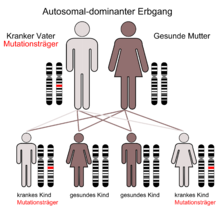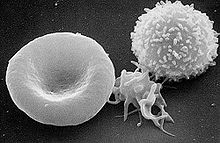- Sebastian-Syndrom
-
Klassifikation nach ICD-10 D69.4[1] Sonstige primäre Thrombozytopenie ICD-10 online (WHO-Version 2011) Das Sebastian-Syndrom ist eine äußerst seltene autosomal-dominante Erbkrankheit. Sie wird durch eine Mutation des MYH9-Gens verursacht. Das Sebastian-Syndrom gehört zusammen mit dem Fechtner-Syndrom, dem Epstein-Syndrom und der May-Hegglin-Anomalie zur Gruppe der MYH9–assoziierten Erkrankungen.
Inhaltsverzeichnis
Ursache und Genetik
Das von der Mutation betroffene MYH9-Gen befindet sich beim Menschen auf Chromosom 22 Genlocus q11.2.[2][3] Als Folge der Genmutation haben die betroffenen Patienten eine Makrothrombozytopenie, die sich durch einen Mangel an Thrombozyten (eine sogenannte Thrombozytopenie) und übergroßen Thrombozyten mit Leukozyteneinschlüssen, die allerdings kleiner als bei der May-Heggelin-Anomalie sind, manifestiert. Die Krankheit wird autosomal-dominant vererbt.
Epidemiologie und Indizenz
Es wird geschätzt, dass weltweit etwa 50 Menschen, beziehungsweise etwa zehn Familien vom Sebastian-Syndrom betroffen sind. Aufgrund der Seltenheit der Erkrankung sind signifikante demographische Tendenzen nicht erkennbar. Männer und Frauen erkranken offensichtlich mit gleicher Wahrscheinlichkeit.[4]
Symptome
Die Betroffenen habe eine starke Neigung zum Nasen- und Zahnfleischbluten. Frauen mit dem Sebastian-Syndrom haben deutlich stärkere Menstruationsblutungen, als gesunde Frauen.
Therapie
Für die meisten vom Sebastian-Syndrom betroffenen Patienten ist keine spezielle Behandlung notwendig. Nach Operationen sind gegebenenfalls Thrombozytentransfusionen notwendig, um schwere Blutungen zu verhindern.[4]
Prognose
Patienten mit dem Sebastian-Syndrom haben prinzipiell eine normale Lebenserwartung. Die Hauptgefahr für die Betroffenen besteht bei Operationen oder Verletzungen durch die sehr langsame Blutgerinnung, die unter Umständen zum Verbluten führen kann.[4]
Entdeckung
Das Sebastian-Syndrom wurde erstmals 1990 von Greinacher et al. beschrieben.[5]
Einzelnachweise
- ↑ orpha.net: Sebastian-Syndrom, abgerufen am 7. April 2008
- ↑ UCSC Genome Browser on Human Mar. 2006 Assembly: chr22:35,007,273-35,113,958
- ↑ genome.ucsc.edu: Human Gene MYH9 (uc003apg.1) Description and Page Index
- ↑ a b c P. A. Johnson: Sebastian syndrome In: Gale Encyclopedia of Genetic Disorders Part I, 2002
- ↑ A. Greinacher, C. Mueller-Eckhardt: Hereditary types of thrombocytopenia with giant platelets and inclusion bodies in the leukocytes. In: Blut 60/1990, S.53-60. PMID 2154271
Literatur
- D. C. Balderramo u. a.: Sebastian syndrome: report of the first case in a South American family. In: Haematologica 88/2003, ECR17. PMID 12745286
- S. Deutsch u. a.: Asp1424Asn MYH9 mutation results in an unstable protein responsible for the phenotypes in May-Hegglin anomaly/Fechtner syndrome. In: Blood 102/2003, S.529-34. PMID 12649151
- A. Greinacher u. a.: Sebastian platelet syndrome: a new variant of hereditary macrothrombocytopenia with leukocyte inclusions. In: Blut 61/1990, S.282-8. PMID 2176899
- S. Kunishima u. a.: Mutations in the NMMHC-A Gene Cause Autosomal Dominant Macrothrombocytopenia with Leukocyte Inclusions (May-Hegglin Anomaly/Sebastian Syndrome). In: Blood 2001, S.1147-9.
- P. Mhawech, S. Abdus: Inherited Giant Platelet Disorders: Classification and Literature Review. In: American Journal of Clinical Pathology 2000, S.176-90.
- N. Pujol-Moix u. a.: Sebastian platelet syndrome In: Annals of Hematology 62/1991, S.235-7
- N. Pujol-Moix u. a.: Ultrastructural analysis of granulocyte inclusions in genetically confirmed MYH9-related disorders. In: Haematologica, 89/2004, S.330-7. PMID 15020273
- M. Di Pumpo u. a.: Defective expression of GPIb/IX/V complex in platelets from patients with May-Hegglin anomaly and Sebastian syndrome. in: Haematologica 87/2002, S.943-7. PMID 12217806
- M. Saito u. a.: Hematological abnormalities in a patient with a 22q11.2 deletion. In: Brain Dev 26/2004, S.342-4. PMID 15165677
- M. Seri u. a.: Mutations in MYH9 result in the May-Hegglin anomaly, and Fechtner and Sebastian syndromes. The May-Heggllin/Fechtner Syndrome Consortium. In: Nature Genetics 26/2000, S.103-5. PMID 10973259
- M. Seri u. a.: MYH9-related disease: May-Hegglin anomaly, Sebastian syndrome, Fechtner syndrome, and Epstein syndrome are not distinct entities but represent a variable expression of a single illness. In: Medicine (Baltimore) 82/2003, S.203-15. PMID 12792306
- G. Young u. a.: Sebastian syndrome: Case report and review of the literature. In: American Journal of Hematology 61/1999, S.62-5.
Weblinks
- Sebastian-Syndrom bei Online Mendelian Inheritance in Man
- genome.ucsc.edu: Human Gene MYH9 (uc003apg.1) Description and Page Index (engl.)

Bitte den Hinweis zu Gesundheitsthemen beachten! Kategorien:- Krankheitsbild in Hämatologie und Onkologie
- Erbkrankheit
Wikimedia Foundation.


